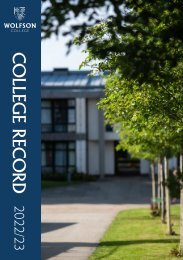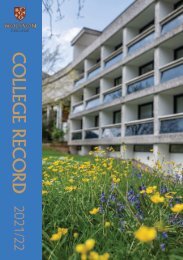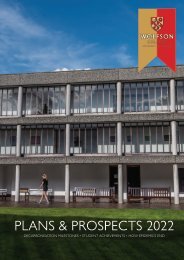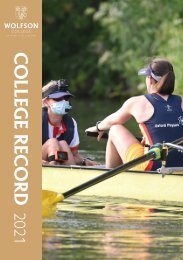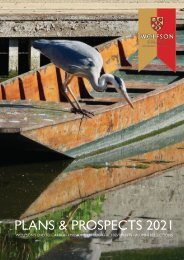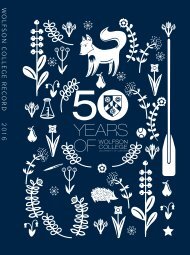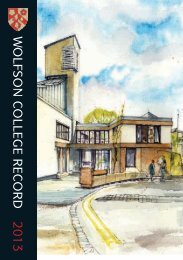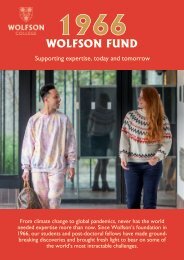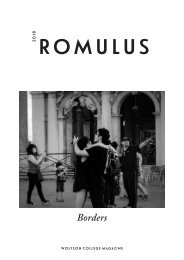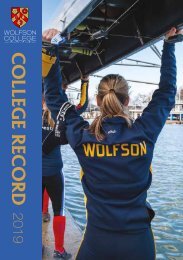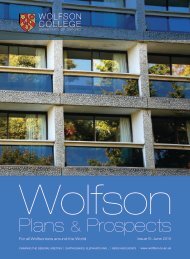Plans & Prospects 2023
Plans & Prospects is the annual magazine for alumni and friends of Wolfson College at the University of Oxford. We hope that you enjoy reading about life here at Wolfson, and welcome your feedback or article suggestions for next year's issue.
Plans & Prospects is the annual magazine for alumni and friends of Wolfson College at the University of Oxford. We hope that you enjoy reading about life here at Wolfson, and welcome your feedback or article suggestions for next year's issue.
Create successful ePaper yourself
Turn your PDF publications into a flip-book with our unique Google optimized e-Paper software.
Curiosity and risk<br />
Dr Kateryna Kovalchuk is a Ukrainian medieval historian whose research focuses on Byzantine legend. She<br />
joined Wolfson College in 2022, her two-year stay made possible thanks to the generosity of the many alumni<br />
who responded so generously to our Giving Day appeal for at-risk scholars in May 2022. She sat down with our<br />
Communications Team to discuss her work for an edition of Wolfson’s Pivot Points podcast.<br />
Visiting Scholar, 2022<br />
Dr Kateryna Kovalchuk values her<br />
curiosity. Without it, “everything<br />
becomes insipid.” Curiosity, she says,<br />
is “quintessential” to her research into<br />
the legends and myths of Byzantine<br />
civilisation; but as becomes apparent<br />
over the course of our conversation, for<br />
Kateryna, curiosity isn’t something that<br />
can safely be indulged in the security of<br />
the library. The way Kateryna describes<br />
it, her curiosity involves real risk, and<br />
has led her into the unknown on more<br />
than one occasion over the last three<br />
decades.<br />
Coming of age in post-Soviet Ukraine,<br />
Kateryna’s first academic passion was<br />
for the literatures of ancient Greece and<br />
Rome, and she recalls how she would<br />
have stayed in Lviv to pursue a doctorate<br />
in Classical Philology were it not for a<br />
series of chance encounters. A brochure<br />
caught her eye in the library one day,<br />
“and flicking through the pages, I saw<br />
the programme in medieval studies, and<br />
my heart started pumping. I melted.”<br />
She had been working as amanuensis to<br />
20<br />
one of her professors, who at the same<br />
moment was contacted by colleagues<br />
in Hungary seeking a deserving student<br />
to enrol on a medieval studies course.<br />
Circumstances had conspired to direct<br />
Kateryna’s attention towards the world<br />
of the Byzantine Empire, famous for<br />
its lavish iconography, mosaics and<br />
intricate goldwork, and origins shrouded<br />
in myth; her curiosity was hooked. In<br />
the first of many migrations, she found<br />
herself studying at the Central European<br />
University in Budapest. “It was extremely<br />
hard, excruciatingly hard, because it<br />
was the first time I had done something<br />
in English,” she tells me, “the level of<br />
scholarship was higher. I was deprived of<br />
sleep. But it was absolutely fascinating.”<br />
At the time, travelling abroad to study<br />
was an unheard-of rarity, and it meant<br />
leaving behind family for the first time.<br />
But Kateryna took the risk, and she<br />
speaks fondly of her years in Budapest:<br />
the department was welcoming, tightknit<br />
and egalitarian, with her professors<br />
insisting on students calling them by<br />
their nicknames, and the intensity of the<br />
programme encouraged close friendships<br />
among the students. Her curiosity had<br />
paid off. Kateryna is keen to emphasise<br />
that curiosity isn’t an easy thing to<br />
come to terms with; even in her early<br />
career, regularly moving countries took<br />
its toll. “I did have to make choices, and<br />
they were hard choices.” Judging from<br />
the intertwined strands of her life and<br />
research, Kateryna’s academic curiosity<br />
has been a source of strength in the<br />
face of the enormous challenges she,<br />
her communities, and her home country<br />
have had to confront in the last few<br />
years. It has given her ways to live with<br />
what she calls “bewilderment,” quoting<br />
the poet Rumi; sometimes even to<br />
embrace it.<br />
Kateryna’s work principally concentrates<br />
on Byzantine narratives of church and<br />
monastery foundations. Nowadays, she<br />
says, we have a tendency to dismiss<br />
the more fanciful accounts set down<br />
in the manuscripts: “they are based on<br />
events, people, coordinates that exist



